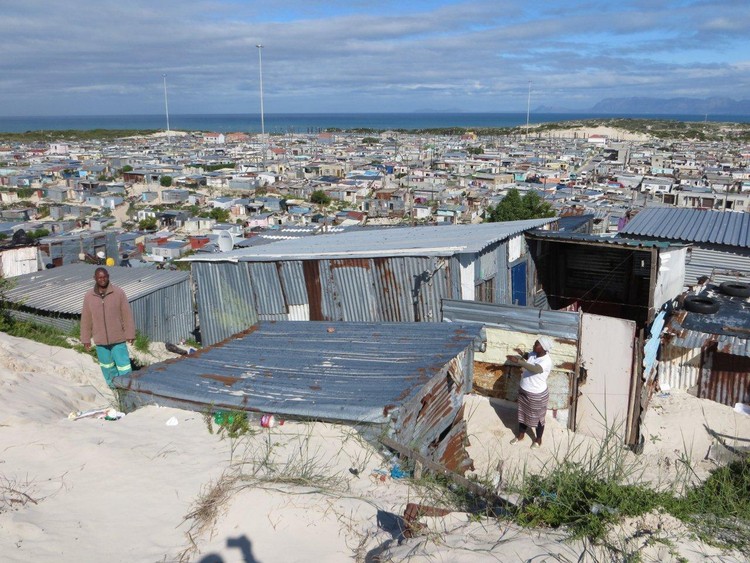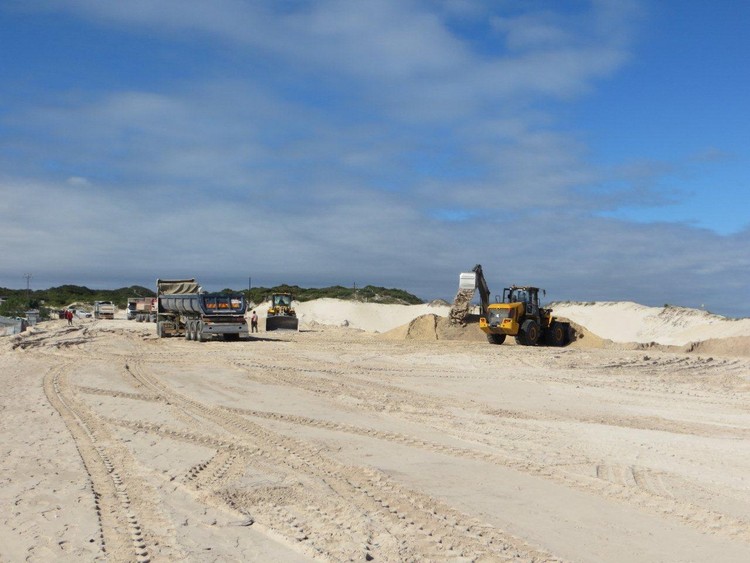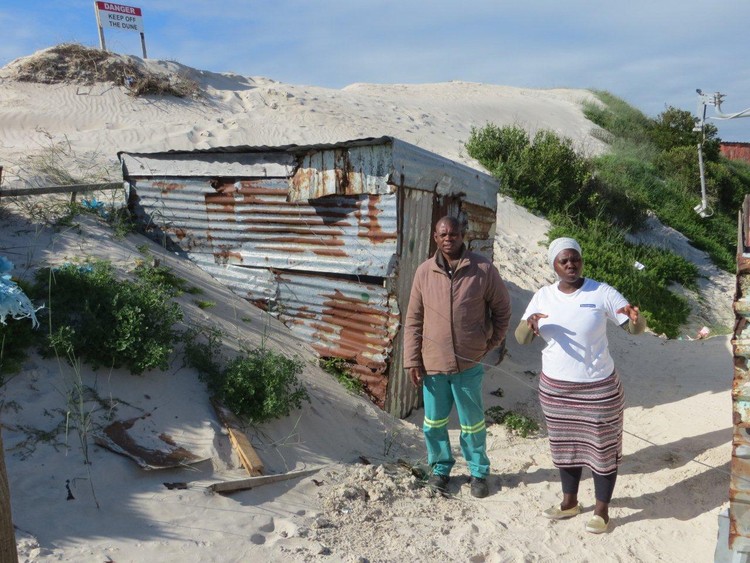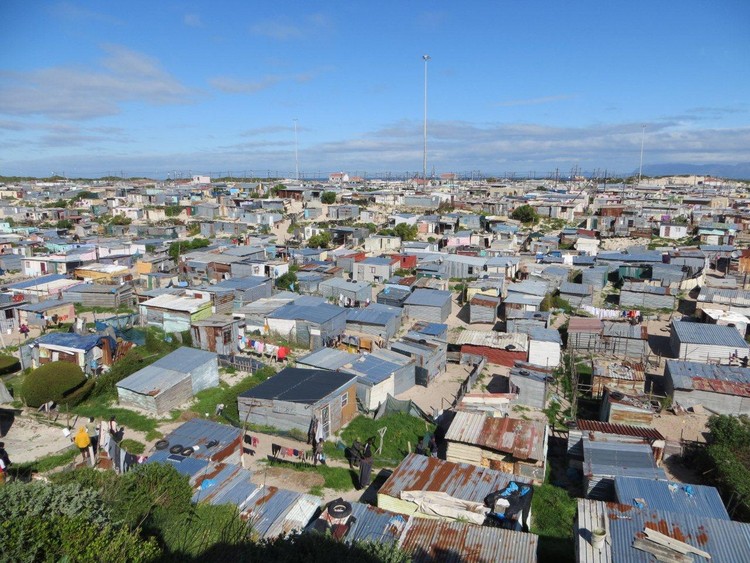Standoff between shack dwellers and sand mining company in Khayelitsha
Mining operations halted after families living in shacks near the site complain about sand filling their homes
Vosho informal settlement residents Bongani Khawushe and Nonkululeko Nyathi point out some of the shacks covered by sand near the sand dune currently being mined by Maccsand. Many people have abandoned the shacks near the site. Photos: Vincent Lali
- A sand mining company operating in Khayelitsha, Cape Town, has suspended operations after shack dwellers complained their homes are filled with sand and have become inhabitable.
- The company was granted a permit by the national Department of Mineral Resources and Energy in 2018, before most of the shacks were built on the land.
- The City of Cape Town gave permission for the company to operate on the land in 2019 and moved some of the families. The others will not be moved until next year.
- Meanwhile, the City says, the permission it granted has expired.
- The City is to investigate the matter.
Families in Vosho informal settlement in Khayelitsha say sand being moved by a sand mining project nearby is making their homes uninhabitable.
The area, with shacks perched on a large dune, has been nicknamed Plattekloof after the suburb in the north where homes overlook the city.
According to the City of Cape Town mining company, Maccsand was granted a permit by the national Department of Mineral Resources and Energy in 2018, before most of the shack dwellers occupied the land. The permit expires in 2024. Deputy Mayor and Mayoral Committee Member for Spatial Planning and Environment, Eddie Andrews, said in 2019 the City had granted the company permission to remove the dune. The permission lapsed in October 2021.
After the mushrooming of Vosho informal settlement, the City moved hundreds of families to land near Baden Powell Drive in 2020/21, but a few shacks remain, close to the site. Families living there told GroundUp that their homes, food and other belongings are covered in sand.
Sand mining company Maccsand was granted a permit to mine this land in 2018, before most of the shacks were errected here.
“The sand moves into the shacks because the construction vehicles work too close to them. We don’t want the project to continue to compromise the safety of the residents,” said community leader Baphelele Dokolwana. Dokolwana said residents wanted to be moved.
But the City said environmental restrictions on the land where the Vosho families had been moved meant it could only accommodate 335 families. The remaining families would be moved in 2024, the City said.
Community leader, Nonkululeko Nyathi, said some shacks near the site had been abandoned. “The sand invaded some shacks and made them unliveable. One resident can’t even open their door. The affected residents have no money to buy material to rebuild elsewhere,” said Nyathi.
Bongani Khawushe, who settled in Vosho in 2018, said he had been forced to abandon his shack. “My brother and I removed the sand from behind my shack with spades, but it kept on piling up,” he said. “Everything, including my bed and cupboard, is now covered with sand. I couldn’t even open the door on Wednesday when I came to check on my shack.” Khawushe has since moved to his brother’s home in Makhaza.
Residents Bongani Khawushe and Nonkululeko Nyathi stand near the shacks engulfed by sand with the company’s “danger” sign above it. The City says other safety signage erected by the company was stolen.
Andrews said the City’s land use property inspectors would investigate the matter and take appropriate action.
Asked about safety, the City said the residents’ complaint “appears to be the result of ineffective implementation of health and safety standards by the mining operator.” The City said it was the national department’s responsibility to monitor compliance at the site.
The City promised to investigate and ask the mining company to meet the community and ward councillor to address these issues.
In response to GroundUp’s questions, John Pretorius, Maccsand’s Public Relations Officer, said the dune had overshadowed the shacks “long before Maccsand arrived at the site”. He said shack dwellers building shacks there was “tantamount to inflicting safety hazards amongst themselves due to the close proximity of the shacks on the dune”.
These shacks in Vosho informal settlement erected on top of the sand dune are jokingly called Plattekloof like the suburb as shacks here overlook the community.
But, he said Maccsand had abandoned the levelling of the dune to consult with the councillor and the families concerned. “About eight shacks are affected at this point,” he said.
“We hope the councillor can arrange meetings so that the levelling can proceed. Maccsand will never put residents’ lives in danger as we comply with the Health and Safety Act of 1993,” he said.
Pretorius said residents had “started to panic” when the company’s excavators began work on top of the hill. “The project manager explained to the residents his intention to make it safer. But they seem not to grasp that Maccsand wants to make it safer.”
Support independent journalism
Donate using Payfast

Don't miss out on the latest news
We respect your privacy, and promise we won't spam you.
Next: Not enough public participation: Constitutional Court scraps Traditional and Khoi-San Leadership Act
Previous: Patients spend their weekends waiting to be seen at Mamelodi clinic
© 2023 GroundUp. This article is licensed under a Creative Commons Attribution-NoDerivatives 4.0 International License.
You may republish this article, so long as you credit the authors and GroundUp, and do not change the text. Please include a link back to the original article.
We put an invisible pixel in the article so that we can count traffic to republishers. All analytics tools are solely on our servers. We do not give our logs to any third party. Logs are deleted after two weeks. We do not use any IP address identifying information except to count regional traffic. We are solely interested in counting hits, not tracking users. If you republish, please do not delete the invisible pixel.




